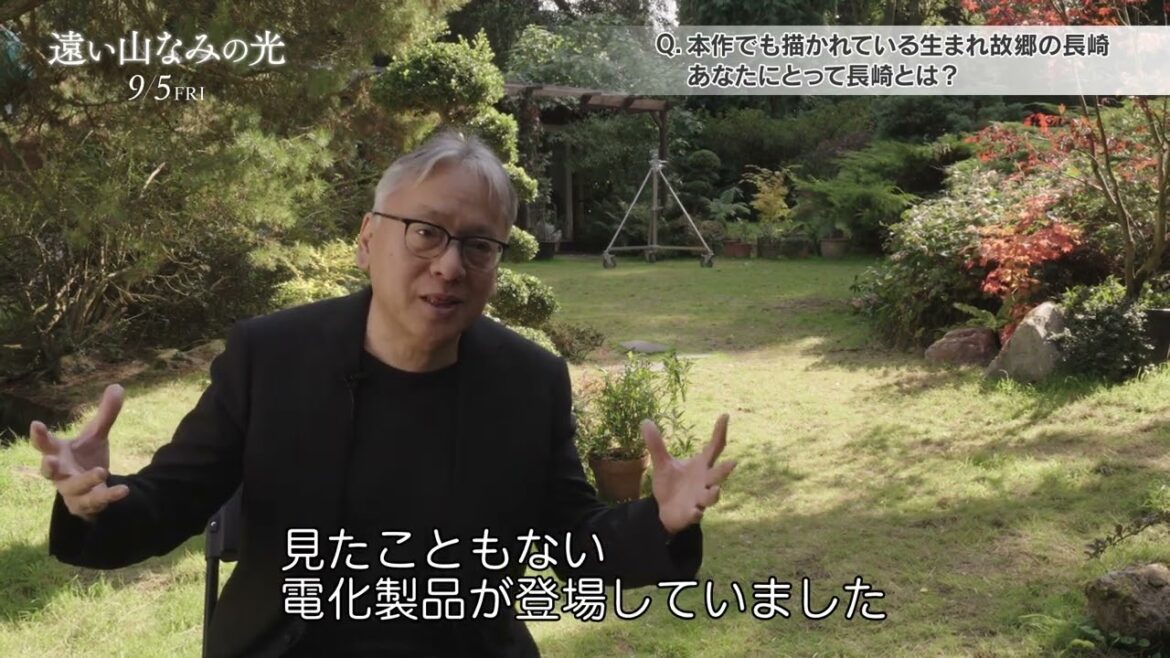映画『遠い山なみの光』原作者カズオ・イシグロが戦争、長崎について語ったインタビュー映像【2025年9月5日公開】
1989 年にイギリス最高の文学賞であるブッカー賞、2017 年にノーベル文学賞を受賞し、二つの世紀を代表する小説家となったカズオ・イシグロの鮮烈な長編デビュー作『遠い山なみの光』を、『ある男』(2022年)で第46回日本アカデミー賞最優秀作品賞含む最多8部門受賞を果たした石川慶監督が映画化した『遠い山なみの光』が9月5日にTOHOシネマズ日比谷 ほか全国で公開される。
ある女が語り始めたひと夏の記憶
その物語には心揺さぶる〈嘘〉が隠されていた
1950 年代長崎と 1980 年代イギリスを生きる 3 人の女たちの
知られざる真実に涙溢れる、感動のヒューマンミステリー
日本人の母とイギリス人の父を持つニキ。大学を中退して作家を目指す彼女は、長崎で戦争を経験した後イギリスへ渡った母の悦子の半生を綴りたいと考える。娘に乞われ、口を閉ざしてきた過去の記憶を語り始める悦子。それは30年前、戦後間もない長崎で暮らしていた頃に出会った、佐知子という女性とその幼い娘と過ごしたひと夏の思い出だった。だが、ニキは次第に母が語る物語に違和感を感じ始め――。
長崎時代の悦子を演じるのは広瀬すず、佐知子に二階堂ふみ、イギリス時代の悦子に吉田羊、ニキにはオーディションで選ばれたカミラ・アイコ、さらに悦子の夫に松下洸平、その父親に三浦友和。そのほか、日本パートには柴田理恵、渡辺大知、鈴木碧桜(子役)らが出演する。
この度解禁となった原作者カズオ・イシグロのインタビュー映像は、悦子役の吉田羊が撮影前から単身で数週間ホームステイをし英語のレッスンを受けてから渾身の思いで撮影に挑んだ撮影地イギリスにて、イシグロが本作と戦争、自身が育った長崎への想いなどを吐露している、今の日本へのメッセージが詰まった貴重な映像。
まず原作を書いてから40年が経ち戦後80年となる年に、この作品が日本で公開されることについてイシグロは「適切な時期だと思います。日本だけでなく世界的に節目となる年で、我々は世界が混乱に陥っていた時代があったことを思い出さなければならない。特に若い世代の人たち、戦争が終わって何年も経ってから生まれた日本の人々はそう。今の日本は豊かさだけでなく、安定性を持った偉大な自由民主主義国家のひとつです。欧米諸国が経験してきたような不安定さは経験していないかもしれない。そんな中、この映画は、その平和な日常が当たり前のものではないことを思い出させてくれる」と語り、「ほんの数世代前は違いました。当時の日本はとても暗い時代で、恐ろしい世界大戦も経験しました。だから今こそ思い出すべきで、こんなふうにそれぞれの世代が、私たちは幸運なのだと忘れないことが大切だと思う。同時にこの平和と民主主義を守り続けなくてはいけない。そんな思いもあって、この映画がこの節目を過ぎてからも、ずっと残っていくことを願っています。そして、何とかこの40年以上残ってきた僕が書いた原作のように、石川さんの映画も何十年も続いて、普遍的で時代を超えた作品として受け入れられると期待しています。なぜなら本作は最悪の状態からどのように人々が立ち直るかを描いているからです」と本作に込められている想いを吐露。
また、本作は女性の物語であることに加えて自身が育った長崎の物語でもあるが、長崎がイシグロにとってどのような存在かについては「私が子供の頃、イギリスでは私が長崎出身と言うと大勢が一つのことを連想しました。原爆です。長崎は“死と破壊の街”だと思われていました。それを聞いてとても不思議でした。私にとって長崎は、希望と明るさの場所だったからです。当時の長崎の雰囲気は、人々が自信を高めていた時期で感嘆と驚きに包まれていたんです。あの頃は毎月のように見たこともない電化製品が登場していました。新しい建物も建てられました。物事がよくなっていると感じていましたし、経済は上向きで人々も明るかった。もちろん長崎そのものもとても美しい街です。街は たくさんの海や山の景色にあふれて、その両方を楽しめました」と語り、「だから私が覚えている長崎のイメージは、太陽、海、広い空、そして山と木々の風景です。街は再生と前進の雰囲気に包まれていたんです。それは、イギリスの人々が抱く「破壊された街」という印象とはまったく異なるものです」と述懐。
また、原爆について深く考えるようになったのは、もっと大人になってからのことだといい「私にとって長崎は、皆が将来に対して希望を持つ街でした。多くの産業が回復して造船所も活気を取り戻し、全て復興していきました。父はアメリカで研究を行った後、イギリスでの生活を望んでいました。外に目を向ける時代でしたね。長崎は古くから「世界への架け橋」でその伝統は長い歴史に根ざしています。私にとって長崎は「近代への扉を開いていった街」です。現代の日本、そして世界への扉をと語っている。
さらにこれから本作をご覧になる方々へ向けて、「皆さんが石川慶さんのこの映画を観てくださると嬉しいです。私がこの小説を出版した時、彼はまだ小さな子どもでした。彼はこの美しい映画を日本の今の世代の人たちに向けてつくることを決めました。彼はこの物語に今の人々に響くものがあると信じているし、私もそう思っています。この作品を楽しんでください!」とメッセージをおくっている。
長崎で生まれ、5歳の時にその地を離れたイシグロは、長崎で暮らしていた頃の思い出について「よく人は、そんな幼い頃の記憶など残っていないだろうと言いますが、実際にはそうではありません。幼いながらも、心の奥に刻まれた風景や感覚は、むしろ鮮明で、今でもはっきりと思い出すことができます。幼少期に離れた場所だからこそ、その記憶を失わないよう、無意識のうちに守り続けてきたのかもしれません」とも語っている。
■ストーリー
日本人の母とイギリス人の父を持ち、ロンドンで暮らすニキ。大学を中退し作家を目指す彼女は、執筆のため、異父姉の死以来足が遠のいていた実家を訪れる。母の悦子は、長崎で原爆を経験し、戦後イギリスに渡ってきていたが、ニキは母の過去を何一つ聞いたことがない。夫と長女を亡くし、想い出の詰まった家で一人暮らしていた悦子は、ニキと数日間を共にする中で、最近よく見るという、ある「夢」について語り始める。それはまだ悦子が長崎で暮らしていた頃に知り合った、佐知子という女性と、その幼い娘の夢だった――。
本作は日本・イギリス・ポーランド合作の3か国共同製作となっており、ポストプロダクションをポーランドで行うなど、ポーランド国立映画大学で映画を学んだ石川慶監督にとっては、まさに原点回帰ともなる特別な作品。戦後80年となる今年9月5日(金)からの全国公開にぜひご期待ください。
原作:「遠い山なみの光」カズオ・イシグロ/小野寺健訳(ハヤカワ文庫)
監督・脚本・編集:石川慶 『ある男』
出演:広瀬すず 二階堂ふみ 吉田羊 カミラ・アイコ 柴田理恵 渡辺大知 鈴木碧桜 松下洸平 / 三浦友和
製作幹事:U-NEXT 制作プロダクション:分福/ザフール 共同制作:Number 9 Films、Lava Films
配給:ギャガ 助成:JLOX+ ⽂化庁 PFI
(C)2025 A Pale View of HIlls Film Partners
Well, I think it’s an appropriate it’s a very appropriate time uh for it to be released because um you know it’s it’s a time when it’s not just for Japan of course it’s for the whole world you know it’s an anniversary um we we’re need to be reminded that there was this time when um the world was in turmoil um and certainly for the for the younger generation um particularly you know perhaps people who’ve grown up in you know who are born in Japan many years after the end of the war. Um, and Japan has been not just a very prosperous country, it’s been a very stable country. you know, it’s been one it’s been one of the great liberal democracies and uh it probably hasn’t gone through a lot of the uncertainties that that some countries in the west has gone through through um and I think it’s it’s it’s a timely reminder that this is not something you can take for granted that you know just a few generations ago um Japan went through a very dark period and then um went through an awful second world war. Um uh and so I think I think that’s a timely reminder and and I think it’s important that we each generation keeps reminding themselves that we’re very lucky and but we have to always fight and and battle to keep this peace and this democracy. Um having said that I you know I would hope that this movie um w will be a film that is that will survive long after this this anniversary. You know it’s I think um just as my my my book has somehow survived for for 42 years and and it’s remained in print all of that time. I would hope that Ishikawasan’s film would also last for decades after the anniversary. You know, I think it’s a film that I’m hoping it’ll be a film that will um be quite universal and timeless because it’s it’s about um because in the end it’s about how people recover from from the worst things. Yeah. Now for many people in in the in Britain when I was growing up, soon as I said I was from Nagasaki, they just thought of one thing. They thought of the atomic bomb and they thought of Nagasaki as this place of death and devastation. And this was quite strange for me because of course for me Nagasaki was a place was indeed a place of hope and optimism. The atmosphere in Nagasaki was it was that time when people were growing growing confident and there was this sense of wonder and amazement about every every month there’ll be some sort of new piece of electronics that that appeared that nobody had seen before or um there was a new building built or something. So there was this real sense of um things getting better and the economy getting better and everybody was optimistic and of course Nagasaki itself is is a very beautiful city. Um it’s it’s there’s a lot of sea and and mountains often you can see these two things together. And so even the visual images I have of Nagasaki is is of sun and sea and open sky and mountains and trees. I mean the atmosphere is is one of regeneration and moving forward. So it’s completely different to this image that British people had of this devastated place. And I didn’t really think about the atomic bomb until I was much older, you know, and living in England. Um, for me, Nagasaki was this uh this place where people were looking forward to the future and of course a lot of the industry was picking up their Mitsubishi uh on in the shipyards and everything was regenerating and our family itself was was one that you know my father was wanting wanting to come to Britain and to he went to the United States to uh to further his own scientific research. So it was a time of um looking outward and Nagasaki has always had this tradition of being a gateway to the international world. I mean this goes back to ancient times. Um and so um I think of Nagasaki like that. It’s a it’s a it’s a it’s a doorway to to the outer world. Um, and it was also for me personally, it’s a place that ushered in this this modern era of modern Japan and and the modern world. I hope you’ll go and see this movie um by uh Mr. K Ishikawa. Um, he was, although he was a tiny boy when I first published this novel, he’s decided to to to create a beautiful film uh for for the Japanese generation today. And he believes that this story will speak to to the current generation. And I think it will, too. And I I hope you would enjoy it.

